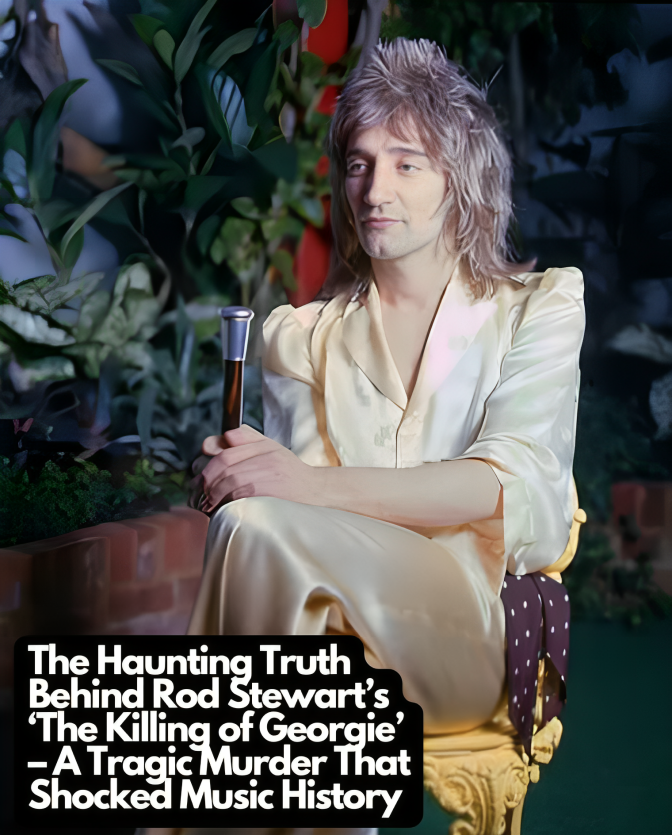OPINION: This article may contain commentary which reflects the author’s opinion.
Rod Stewart’s career has long been marked by his eclectic style and fearless approach to tackling difficult topics, but few songs carry the emotional weight of The Killing of Georgie (Part I and II). Released in 1976 as part of his album A Night on the Town, the haunting ballad told the story of a gay man named Georgie, whose life was tragically cut short by a senseless act of violence. What many fans may not realize is that the story behind the song is deeply rooted in truth, with its chilling narrative based on the real-life murder of a man Stewart knew.
In the late 1960s and early 1970s, Rod Stewart was on the rise. Known for his unmistakable raspy vocals and his work with bands like the Jeff Beck Group and Faces, Stewart’s solo career was gaining momentum. His breakthrough came in 1971 with Every Picture Tells a Story, which featured the chart-topping hit Maggie May. Stewart’s subsequent success continued through the 1970s, with his sound evolving to incorporate a blend of folk, rock, R&B, and soul.
Amid this prolific period, Stewart wrote The Killing of Georgie, a song inspired by a close friend of his and Faces’ keyboardist Ian MacLagan. The real-life Georgie was a gay man who, tragically, was murdered by a New Jersey gang. Stewart revealed in interviews that while he wasn’t present when the murder occurred, he felt compelled to write a song about the incident. “That was a true story about a gay friend of [former band] the Faces,” Stewart told Mojo in 1995. “He was especially close to me and Mac.”
The song begins with a reflective look at Georgie’s life: a kind-hearted man who was accepted by New York’s elite circles, always at the heart of chic parties, and beloved by those around him. The lyrics reveal Georgie’s independent spirit and his yearning for love and acceptance. Yet, as the song unfolds, it takes a darker turn.
One fateful night, Georgie walks down the wrong street and crosses paths with a gang of New Jersey youths. A violent confrontation ensues, leading to Georgie’s tragic death. The song’s lyrics paint a haunting picture of the crime, describing the attack with vivid detail: “A leather kid, a switchblade knife / He did not intend to take his life / He just pushed his luck a little too far that night.” The incident is presented as a senseless act of violence, with Stewart’s lyrics implying that Georgie’s murder may not have been premeditated, but rather the result of a reckless confrontation.
Stewart’s songwriting brought to light issues that were often overlooked in mainstream music at the time, particularly homophobia and violence against LGBTQ+ individuals. While many artists in the 1970s were still hesitant to address such topics, Stewart boldly confronted these issues with raw, poignant storytelling. His decision to write the song was not just a reflection of his personal experiences, but also his immersion in a world where LGBTQ+ individuals were an integral part of his social and professional circles.
The emotional depth of The Killing of Georgie can be traced to Stewart’s own experiences and connections within the LGBTQ+ community. At the time, Stewart had a gay PR man, a gay manager, and many close friends who were gay. The visibility and support of this community likely influenced his decision to write the song. “I think it was a brave step, but it wasn’t a risk. You can’t write a song like that unless you’ve experienced it,” Stewart reflected in a 2016 interview with The Guardian. “It was a subject that no one had approached before. And I think it still stands up today.”
Though Stewart admitted to embellishing certain aspects of Georgie’s story for artistic effect—such as portraying the murder as unintentional—his portrayal of the victim’s life was authentic and filled with empathy. “I thought maybe they didn’t mean to take his life. Maybe they just meant to do him over,” Stewart confessed. His sympathetic rendering of the tragic event serves as a testament to his emotional connection to the story.
Since its release, The Killing of Georgie has remained one of Stewart’s most powerful and poignant songs. Its lyrical complexity and emotional resonance have earned it comparisons to some of the greats, including Bob Dylan’s Hurricane. In fact, Stewart himself has acknowledged this parallel, telling Sounds, “The verse reminds me a bit of [Bob Dylan’s] ‘Hurricane’, only slower.”
The Killing of Georgie not only stands as a piece of musical history but also as a poignant reflection on a time when LGBTQ+ issues were largely ignored in popular culture. Rod Stewart’s unflinching portrayal of Georgie’s tragic end helped to shine a light on homophobia and violence, and remains a powerful anthem of empathy and defiance against bigotry.
The song’s haunting message continues to resonate with listeners today, as it stands as both a musical masterpiece and a heartbreaking reminder of the senseless violence that still plagues marginalized communities.
